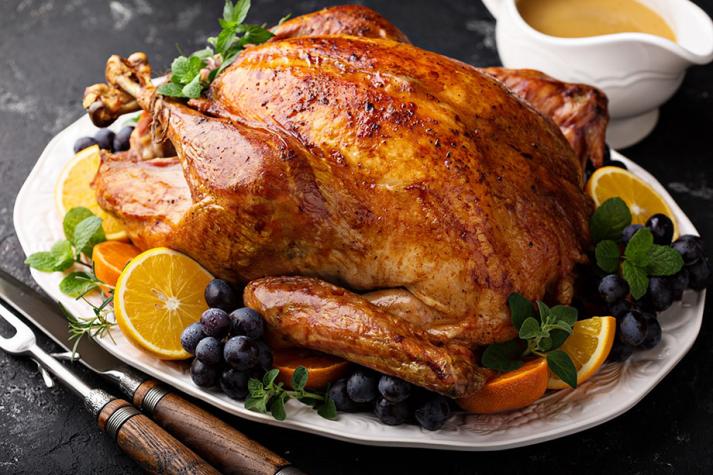INDEPENDENCE, Mo. – Don’t be intimidated by the the prospect of cooking a big Thanksgiving turkey. It’s not that difficult, even for novice cooks, says a University of Missouri Extension nutrition specialist.
First, make sure you have enough bird, says Tammy Roberts. If you’re hosting a large group, get at least 1 pound of whole turkey per person, especially if you want leftovers. If you don’t want leftovers or are cooking a turkey breast, buy ¾ pound of turkey per person.
If you buy a frozen turkey, make sure to allow enough time for it to thaw out. To deter microbial growth, thaw in the refrigerator or in cold water, not on the kitchen counter. Allow one day of thawing in the refrigerator for every 5 pounds of turkey. To thaw in cold water, completely submerge the wrapped turkey in cold water and change the water every 30 minutes so the outer layer of turkey won’t get to warm. This method requires about 30 minutes of thawing for every pound of turkey.
Be sure to clean and sanitize the sink after removing the turkey. But don’t rinse turkey and other meats before cooking. That only spreads those germs around the sink, which can cross-contaminate other foods. Any bacteria that might be rinsed off the surface of the turkey would be easily killed by cooking in the oven.
“We don’t recommend stuffing the turkey,” Roberts says. It’s safer to cook the stuffing outside the turkey in a casserole dish. That’s because it takes stuffing a long time to reach a safe internal temperature when cooked inside the cavity of the bird. Roberts says more people get sick whenever the turkey is stuffed with stuffing.
Once it’s ready for the oven, put the turkey breast side up on a rack in a shallow pan. Using a rack lets the drippings fall below the turkey and will help to evenly distribute the heat around the bird, Roberts says.
Then grab a meat thermometer. “Place the meat thermometer in the thickest part of the breast or the thickest part of the thigh,” she says. Make sure the thermometer is not touching bone. The temperature of the bone will go up faster than the meat.
Set the oven for 325 degrees. An 8- to 12-pound unstuffed turkey will take about 2 3/4 to 3 hours to cook. To prevent over-browning, you might want to put aluminum foil over the turkey for the first half of the cooking time. “Roast the turkey until the thermometer reaches a minimum of 165 degrees,” she says.
Some turkeys in supermarkets are labeled “basted” or “self-basting.” That means the meat has been injected with something to make it flavorful and moist, Roberts says, adding that you might instead want to do that yourself with butter, oil, broth or spices.
But there’s no need to baste while the turkey is cooking. The image of Mom lovingly spooning the juices over the roasting turkey is a perfect Norman Rockwell picture, but it doesn’t really add to the flavor.
“The liquid only penetrates about an eighth to a quarter of an inch, so it only makes a difference in the very top layer of the turkey,” Roberts says.
There is one trick for a moister turkey: “Once you take the turkey out of the oven, let it sit for 20 minutes,” she says. “That allows for the even redistribution of the juices so they spread back through the turkey, and the whole turkey will be moist.”
Leftovers
Refrigerate the turkey (with meat removed from the carcass) in shallow containers within two hours of cooking. If sending leftovers home with guests who will be traveling more than two hours, make sure leftovers are packed in a cooler with ice or cold packs.
Leftover turkey will keep in the fridge for three to four days, but gravy and stuffing will only keep for one or two days. You can also safely freeze leftovers, but use them within two to six months for best quality. Reheat leftovers to 165 degrees.
